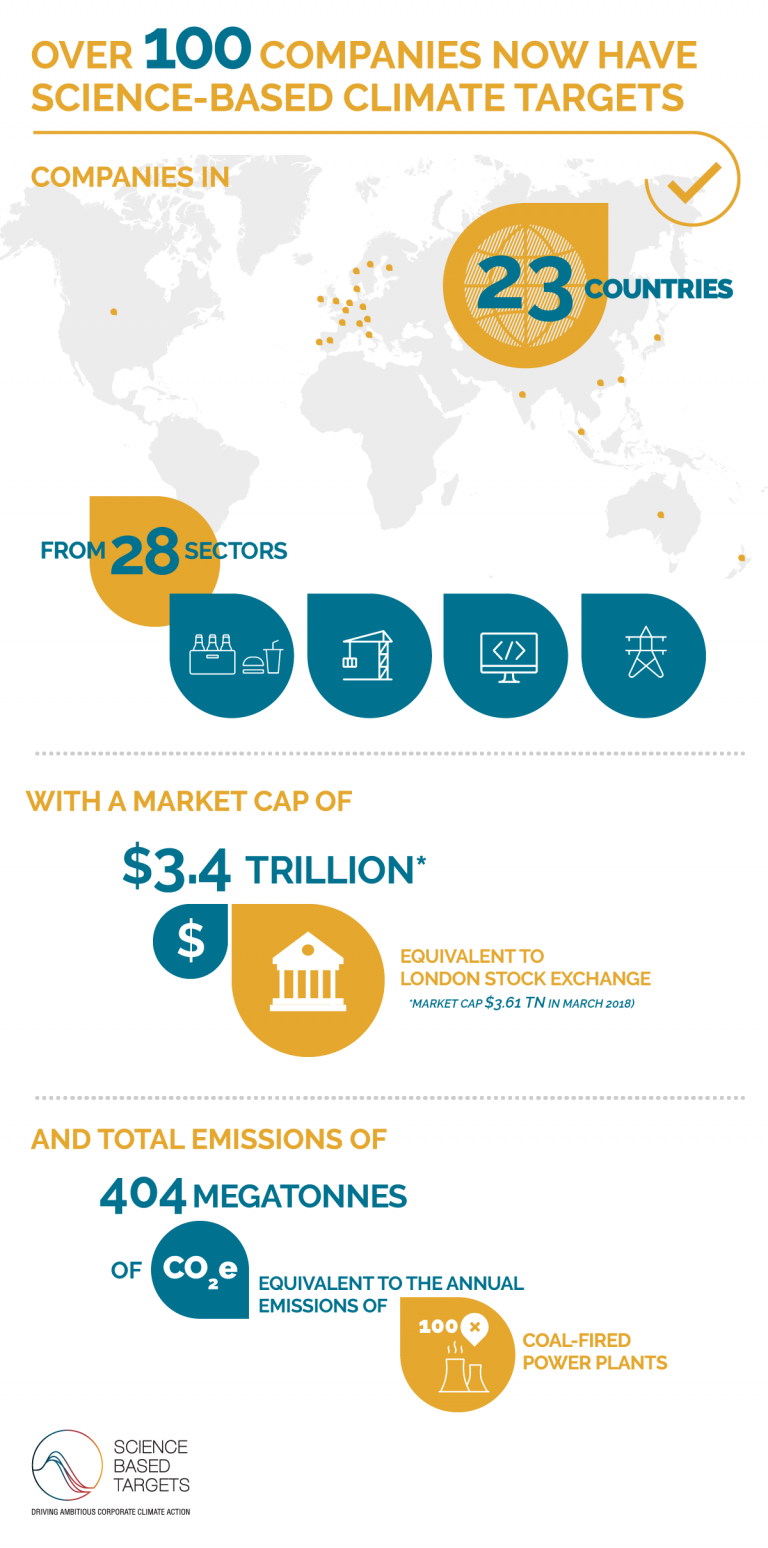
From commitment to action: Science-based targets momentum continues with 100 approved targets
17th Apr 2018
The Science Based Targets initiative is celebrating a major milestone: over 100 companies have turned their commitments into targets and are now working towards emission reductions in line with what climate science says is necessary to limit warming to below 2°C.
Today, companies including Electrolux and L’Oréal have joined some of the world’s best-known corporations blazing a trail to a low-carbon future. In total, some 103 companies now have science-based targets validated by the initiative’s team of experts.
These companies are collectively shining the light on the role businesses have to play in building a sustainable future.
Having gone through the rigorous process of having their targets validated, these companies offer their stakeholders – their investors, buyers and customers – the assurance that will act to address the largest sources of emissions within their operations, and offer a credible pathway in line with the goals of the Paris Agreement.
Together, they are setting in motion a process that is rapidly becoming the new normal.
In the past ten months alone, the number of companies with approved science-based targets has more than doubled, from 43 in April 2017 to 103 today. Meanwhile, with over 90% of the companies also setting science-based targets to reduce emissions across their value chain – their Scope 3 emissions – they are not only aligning their own operations with the Paris Agreement, but using their spending power to drive change across the global economy.
A global trajectory
Science-based target setting is becoming increasingly global in scope.
Mahindra Sanyo Special Steel has made history, today, by becoming the first Indian company to set a science-based target.
It is also the first steel company: proof that companies in high-emitting sectors are now seizing the opportunities of climate action.
“While we are responsible for playing our part in preventing dangerous climate change,” says Uday Gupta, the company’s Managing Director, “we also future-proof our growth and profitability by taking climate action in collaboration with our partners in the value chain.”
Mahindra Sanyo Steel is one of a truly global cohort of companies to turn its commitment to the initiative into an official target.
While the US government has signalled it intends to leave the Paris Agreement, US-based companies are leading the way on setting science-based targets: 24 of the 103 companies with science-based targets are from the US, including McDonald’s, Dell and Proctor & Gamble.
European companies are also blazing a trail to the sustainable economy, with 57 setting targets across the continent. Electrolux and L’Oréal have joined Carlsberg Group, Danone and Unilever with targets already approved by the initiative.
Science-based target setting is also rapidly becoming standard business practice in Japan, where the government is supporting companies to adopt a target. Fifteen Japanese companies – including Fujifilm, Fujitsu and Panasonic – now have a science-based target and a further 41 are committed to doing so.
This global trend will only continue. Over 250 more companies have made a public commitment to the Science Based Targets initiative. From China to Kenya to Colombia, they are working with the initiative’s experts to develop emissions reduction targets.
Why science-based targets?
As more and more companies take steps to set science-based targets, they are showing that these ambitious goals are entirely achievable, but they also make good business sense.
They have not only set a clearly-defined pathway to reduce emissions in line with the goals of the Paris Agreement, but can help drive innovation, ensure regulatory certainty, strengthen investor confidence and improve their profitability and competitiveness.
“It was critical that we worked with others to understand how we could make meaningful impacts,” Kellogg Company’s Senior Sustainability Manager, Amy Braun Senter, says of the company’s decision to work with the initiative’s team of experts.
“They introduced us to the methods – the Sectoral Decarbonisation Approach and the 3% Solution – that helped us to shape and validate our initial thinking,” she adds.
Like others, Kellogg benefitted from our comprehensive consultation and our cutting-edge insights into emissions pathways and methods.
Setting a science-based target makes sound financial sense too, says Keiko Shiga from the Quality & Environment Department at Sony, the first Japanese company to set a target. “It puts us in a good position vis-à-vis our competitors, and also regulators.”
“It means we meet and try to surpass what stakeholders expect of us, keep offering the best to our customers, and in doing so, get ahead of what other companies are doing. We also save money, because of energy efficiency.”
Growing momentum from big emitters

As momentum for climate action grows, some of the highest-emitting companies in the world are also embracing ambitious climate action. Looking to get ahead of their competitors, we’ve seen more and more of these companies join the Science Based Targets initiative.
And, like Mahindra Sanyo Steel, those companies that have turned this commitment into targets are already seeing the benefits.
Thalys, a European high-speed train operator, was the first transport company to set a science-based target. “There is a business opportunity here,” says Dorothée Bernier, from Thalys’ Corporate Social Responsibility Team.
“More and more people want to travel but they also want to choose the sustainable option. As we decarbonize, we also become more attractive to customers.”
For Ørsted, the Danish power company, a science-based target has increased investors’ enthusiasm for the company.
“Investors now see us an interesting company,” says Filip Engel, Senior Director of Group Sustainability, Public Affairs and Branding at Ørsted. “They are looking for companies with a good green profile and they can certainly look to us for that.”
This is having a real impact: with a combined market capitalisation equivalent to some of the world’s largest stock exchanges, these companies can together help steer the global economy down a more sustainable path.
The initiative will continue to work with companies to support further uptake of targets, and is currently working on methodologies for new sectors including the autos sector, oil and gas, and financial institutions.
The path ahead
In the run-up to the Global Climate Action Summit in California, we look forward to welcoming an unprecedented number of companies to the initiative.
On top of the 250 companies currently committed to the initiative, some 860 more have already signaled their intention to set science-based targets by 2019.
With Anand Mahindra, Chairman of the Mahindra Group, calling on his business peers to join his companies in committing to the Science Based Targets initiative, there are encouraging signs it is becoming a truly universal movement.
As the initiative moves into the next crucial phase of its development, it is clear that companies across the world have come to see science-based targets as vital to their environmental ambitions and their business success.
The companies that have already set science-based targets prove that the business community can and must step up to play its part in reducing emissions in line with the world’s low-carbon goals. Where they lead, others will follow.
Latest News
View News


